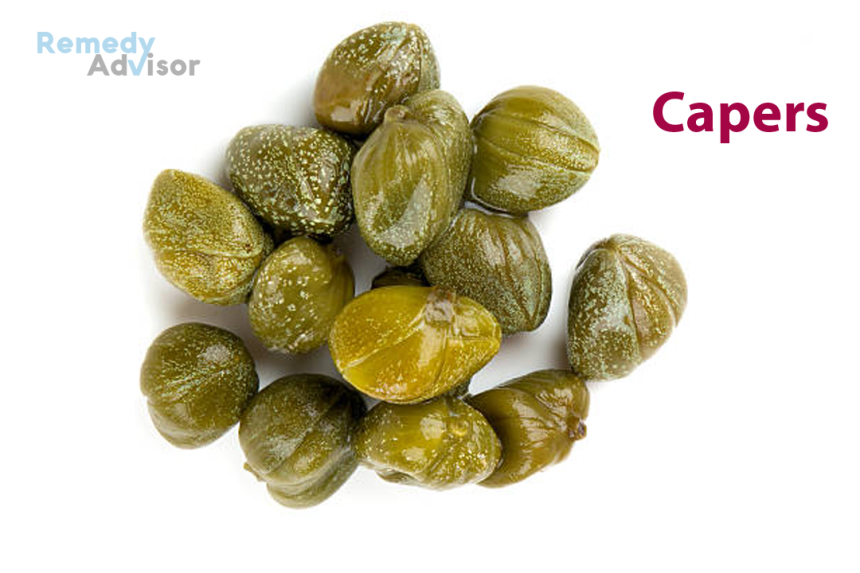Since they are so tiny and used more frequently as an enhancer and/or seasoning, it might be interesting for some to consider about the healthfulness of capers. But, they are an essential portion of the Mediterranean diet, and there is certain convincing study on these preserved flower buds of a perennial spiny bush identified as Capparis spinosa.
Furthermore, capers do not contain fat; they contain Vitamin A and E, protein, calcium, manganese and niacin. They are a good source of Vitamin C and K, iron, dietary fiber, riboflavin, and magnesium, foliate and copper. Above all, they consist of huge quantities of quercetin, a prevailing antioxidant flavonoid.
On the adverse side, the capers are commercially accessible and consist of huge quantities of sodium. Still, a good deal of this may be cleaned off in a strainer just before the capers are consumed. However the study on capers is slightly incomplete, it is significant
Cancer prevention
Prostate Cancer
In a laboratory study, scientists had dogged that quercetin can block the androgen activity in androgen-responsive human prostate cell lines. By hindering this action, the growth of prostate cancer cells might be prevented. Scientists recommend that quercetin has the potential “to become a chemo therapeutic or chemo-preventive agent for prostate cancer.”
Colon Cancer
In a research, investigators treated human colon adenocarcinoma cells along with quercetin. After treatment, the scientist found a “reduced expression of three proteins and the increased expression of one protein.” In accordance to the researchers, “such variations in the levels of these proteins might cause the chemo-protective action of quercetin toward colon cancer.”
In a research, scientists investigated how laboratory rats with or without the initial stages of colon cancer reacted to diets enhanced with quercetin. Researchers found that the rats fed the quercetin had a better capability to sustain steadiness between the development of healthy new cells and the decease of cells that have accomplished their work. Those rats had minor rates of new cancer cells and higher rates of cells experiencing cell death, a procedure known as apoptosis. Therefore, the rats that took supplemental quercetin had better colon health.
These same scientists also studied Cox-1 and Cox-2, two enzymes which are found in colon cancer. They found that the rats that consumed quercetin had lower levels of these enzymes within their bodies. However more study is clearly required, the researchers guessed that quercetin might defeat tumor development.”
Cardiovascular health
In a research, researchers tried to conclude if the consumption of quercetin supplementation over a 28-day time might reduce blood pressure in individuals with raised levels, an ailment known as hypertension. Randomized, double-blind, placebo-controlled, crossover research comprised 19 men and women with prehypertension and 22 men and women with stage 1 hypertension. Quercetin supplementation did not change the blood pressure levels of the subjects with prehypertension. Though, following treatment, the subjects with stage 1 hypertension had decreased levels of systolic, diastolic, and mean arterial pressures. Researchers noted that, “these data are the first to our understanding to show that quercetin supplementation decreases blood pressure in hypertensive matters.”
Many years before, in a study, Moroccan investigators examined the outcome of oral dosages of caper extracts on the lipid breakdown of normal and diabetic rats. Levels of plasma triglyceride were calculated after one week and again after two weeks. In both cases, the normal and diabetic rats had a substantial reduction in plasma triglyceride absorptions. For the time being, levels of plasma cholesterol were measured in the normal rats after four days and again after a week. In both circumstances, the normal rats had dropped cholesterol levels. The levels of cholesterol of the diabetic rats were calculated after four days and again after two weeks. Again, there were important drops. After four days of the caper extract, the diabetic rats had a major decrease in body weight. Scientist noted that it seemed that the extract of capers “shows a strong lipid lowering action in both severe and normal hyperglycemic rats after repetitive oral administration of CS aqueous extract.”
Overall health
In an Italian study, researchers included caper extracts to grilled turkey meat. Then, after simulating digestion, they analyzed the byproducts. Researchers learned that the capers, even when utilized in only small amounts, assisted prevent pro-oxidants, molecules that attack healthy cells and have been related with an increased chance of cardiovascular disease and cancer. Researchers concluded that capers might well be advantageous for health, particularly for those people who consume foods that are greater in fat and red meat.
Reduced risk for influenza
In a study, South Carolina researchers randomly assigned mice to one of four treatment groups: exercise-placebo, quercetin, exercise, controhplacebo, or controhquercetin. Mice that exercised ran to fatigue on a treadmill for three successive days. Researchers dogged that the mice that exercised were at increased chance for the flu. Yet, the mice that do exercises and use quercetin had nearly the same amount of illness as those who did not workout. The severity of illness among the mice which did not workout was about the same as the mice that did exercise but took quercetin. Researchers noted that the short-term use of quercetin may “reduce the effect of stressful workout on vulnerability to respiratory infection.”
Increased endurance
In another research, researchers determined that mice who received seven days of quercetin supplementation had more mitochondria within their brain cells and muscle. That gave the mice more energy and allowed them to run considerably longer before exhaustion compared to the mice fed placebos. Researchers mentioned that the “benefits of quercetin on fitness without exercise training might have significant implications for improvement of athletic and military performance and might also spread to prevention and/or treatment of long-lasting diseases.”
Are capers a healthy addition to the diet? From the earlier noted research, they surely seem to be.







